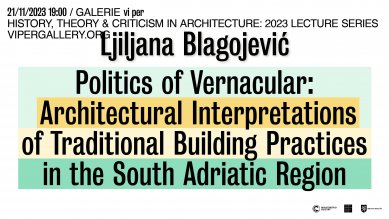
Ljiljana Blagojević: Politics of Vernacular - lecture at Gallery VI PER
Architectural Interpretations of Traditional Building Practices in the South Adriatic Region
Source
Galerie VI PER
Galerie VI PER
Publisher
Tisková zpráva
20.11.2023 12:50
Tisková zpráva
20.11.2023 12:50
Lectures
Czech Republic
Prague
Karlín
The lecture will focus on the relationships between modern architecture and folk culture in the southern Adriatic region of former Yugoslavia, in today's Bosnia and Herzegovina, Montenegro, and Croatia. The turn to vernacular culture as a valuable heritage, architectural inspiration, and technical know-how was largely related to the expansion of tourism in the 1930s and its development in the region in the decades after World War II. The architectural use of vernacular materials and motifs responded not only to the commercial demands for the authenticity of the tourist experience but, as I argue, opened a path out of the crisis of modernism and the increasing criticism of its formalism, monotony, alienating coldness, etc. I will inquire whether and in what ways the interpretive approaches to folk culture responded to changing political, that is, ideological narratives alongside professional and economic agendas. In other words, can the study of the architectural reinterpretation of traditional building techniques, materials, and typologies lead to a better understanding of the politics of vernacular art and its outcomes in today’s architecture.
Dr. Ljiljana Blagojević, architect, architectural historian, and theorist. As a practicing architect, she worked at the offices of Zaha Hadid and RHWL in London and at the Institute for Architecture and Urbanism in Belgrade. She taught architectural design, history, and theory at the Faculty of Architecture at the University of Belgrade and was a guest at the Yale School of Architecture, the University of Donja Gorica in Podgorica, and the University of Novi Sad. At the invitation, she lectured at ETH Zurich, the Polytechnic University of Milan, Harvard University GSD, Parsons/The New School, Yale School of Architecture, the Academy of Fine Arts in Vienna, the University of Zagreb, and elsewhere. She is a member of the Salzburg Global Seminar, lectured at the European Forum in Alpbach and the European Habitat of the UN, and chaired the conference of the European Architectural History Network (EAHN). Blagojević is the author of scholarly monographs Modern House in Belgrade, 1920–1941 (Belgrade, 2000), Modernism in Serbia: The Elusive Margins of Belgrade Architecture, 1919–1941 (Cambridge MA, 2003), Novi Beograd: Contested Modernism (Belgrade, 2007), Itineraries: Modern and Mediterranean. Tracing the Steps of Architects Nikola Dobrović and Milan Zloković (Belgrade, 2015) and co-author of the book Dobrović in Dubrovnik: A Venture in Modern Architecture (Berlin, 2015). Her articles have been published in journals such as Planning Perspectives, The Journal of Architecture, Architecture Research Quarterly, Architectural History, Prostor, Architektura & Urbanizmus, and other professional periodicals. She is a co-author of the Serbian pavilion at the 11th International Architecture Exhibition in Venice. She has received the Association of Serbian Architects Award for Lifetime Achievement, the Ranko Radović Award, and the Grand Prix of the Salon of Architecture in Belgrade.
Dr. Ljiljana Blagojević, architect, architectural historian, and theorist. As a practicing architect, she worked at the offices of Zaha Hadid and RHWL in London and at the Institute for Architecture and Urbanism in Belgrade. She taught architectural design, history, and theory at the Faculty of Architecture at the University of Belgrade and was a guest at the Yale School of Architecture, the University of Donja Gorica in Podgorica, and the University of Novi Sad. At the invitation, she lectured at ETH Zurich, the Polytechnic University of Milan, Harvard University GSD, Parsons/The New School, Yale School of Architecture, the Academy of Fine Arts in Vienna, the University of Zagreb, and elsewhere. She is a member of the Salzburg Global Seminar, lectured at the European Forum in Alpbach and the European Habitat of the UN, and chaired the conference of the European Architectural History Network (EAHN). Blagojević is the author of scholarly monographs Modern House in Belgrade, 1920–1941 (Belgrade, 2000), Modernism in Serbia: The Elusive Margins of Belgrade Architecture, 1919–1941 (Cambridge MA, 2003), Novi Beograd: Contested Modernism (Belgrade, 2007), Itineraries: Modern and Mediterranean. Tracing the Steps of Architects Nikola Dobrović and Milan Zloković (Belgrade, 2015) and co-author of the book Dobrović in Dubrovnik: A Venture in Modern Architecture (Berlin, 2015). Her articles have been published in journals such as Planning Perspectives, The Journal of Architecture, Architecture Research Quarterly, Architectural History, Prostor, Architektura & Urbanizmus, and other professional periodicals. She is a co-author of the Serbian pavilion at the 11th International Architecture Exhibition in Venice. She has received the Association of Serbian Architects Award for Lifetime Achievement, the Ranko Radović Award, and the Grand Prix of the Salon of Architecture in Belgrade.
The English translation is powered by AI tool. Switch to Czech to view the original text source.

0 comments
add comment












